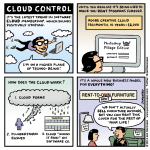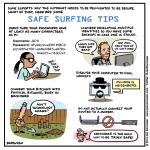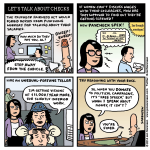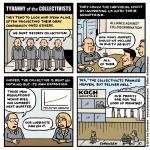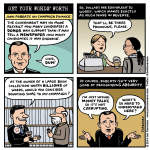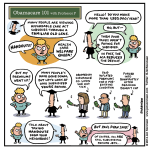The Sorensen Monologues
Cloud Control
It was time to upgrade my version of Photoshop last week, and as many a visual artist can tell you, Adobe is steering its users into the “Creative Cloud.” This is a monthly subscription service, wherein the same programs that cost several hundred dollars in 2006 now cost… well, there’s no telling really, since you keep paying into infinity. Apparently paying for software you can install on your computer and use as long as you like is passé. Not long after I purchased an old-fashioned non-cloud program, the Adobe server crashed, preventing people everywhere from signing into the cloud for a day or so. You could almost hear the screams of designers around the world.
If you’re a cartoonist who doesn’t need all the latest advanced photography features, I recommend buying one of the vanishing copies of Photoshop CS6 and sitting on it.
Herblock speech
The Herblock Foundation has posted the video and transcript of my acceptance speech on their website. The whole thing went well, but for some reason the camera makes me look about twenty pounds heavier than I am. I assure you I have not been celebrating my Herblock win by gorging myself endlessly on honey hams and chocolate tortes, although a chocolate torte would taste pretty good right about now.
Gift Ideas for the Unvaccinated
Before this cartoon appeared many places, I began hearing from anti-vaccine people. More are sure to follow in the coming days. It’s almost laughable for me to have to type this, but let me say up front: I have absolutely no ties to Big Pharma. In general, I find pharmaceutical companies to be morally skeevy, but this does not mean vaccinations are some sort of conspiracy. Nor does it disprove the science supporting vaccination as an essential part of public health.
When all reputable medical organizations — the World Health Organization, the Center for Disease Control, etc. –- tell us that that any link between autism and vaccines has been thoroughly refuted, it takes a hefty dose of paranoia to think that you know better. What is fascinating about this issue is that it parallels global warming denial, but with a large lefty contingent. It’s a bit depressing, actually. But if progressives want to continue calling themselves “reality-based,” they have to take on pseudoscience wherever it appears.
This all started with a fraudulent paper in a prominent medical journal, long since retracted and refuted. It then took on a life of its own, fed by celebrities such as Jenny McCarthy and even Robert Kennedy Jr. Nowadays it mostly boils down to the idea that Big Pharma is engaged in a huge cover-up in order to sell vaccines. I’m the first to note the many evils of many big corporations, but you cannot simply dismiss an overwhelming scientific consensus that there is no connection between vaccines and autism, based on many subsequent studies. There is a difference between healthy skepticism and anti-intellectual paranoia, and this clearly crosses that line.
This wouldn’t matter so much if it wasn’t vaccines we are talking about here, one of the most important life-saving inventions of all time. Experts in the U.S. say we are already getting small-scale outbreaks because of the anti-vaccine movement, and experts outside the U.S. are getting increasingly worried about the potentially catastrophic consequences if these ideas get entrenched in the developing world. A recent Center for Disease Control study estimates that vaccines in the U.S. from 1994-2013 will save 732,000 lives. We are talking about untold numbers of lives at stake here.
Here are just a few useful links:
http://www.cdc.gov/vaccinesafety/concerns/autism/
http://www.who.int/features/qa/84/en/
http://thechart.blogs.cnn.com/2013/03/29/vaccine-autism-connection-debunked-again/
http://en.wikipedia.org/wiki/MMR_vaccine_controversy
http://www.theatlantic.com/national/archive/2009/10/the-new-pandemic-of-vaccine-phobia/28703/
http://news.nationalgeographic.com/news/2013/07/130716-autism-vaccines-mccarthy-view-medicine-science/
Delayed posting + WaPo article
I had a whirlwind of a week in DC for the Herblock ceremony, and did not get around to posting the latest cartoon on Monday as usual. Fortunately(?), Donald Sterling is still making headlines by putting his foot in his mouth.
Also, be sure to check out this truly wonderful Washington Post article by Michael Cavna that was published the day of the Herblock event.
Society of Professional Journalists Award
Well, I’m having a good year. I’ve been named a winner of the SPJ’s Sigma Delta Chi Award, along with my colleague Angelo Lopez. Angelo is a talented cartoonist, and I encourage you to check out his work.
Let’s Talk About Checks
The Paycheck Fairness Act, recently torpedoed in the Senate, addressed some glaring problems that have generated less discussion than they should. This useful post (“Why Do Bosses Want Their Employees’ Salaries to be Secret?”) by Michelle Chen on The Nation explains the need for protections for workers who discuss their salaries:
Lily Ledbetter had been a loyal employee of Goodyear Tires for nearly two decades before she discovered she had been underpaid for years. What angered her most wasn’t the lost pay but the betrayal of her economic dignity.“When I was hired they let me know that if I discussed my pay, I wouldn’t have a job. So I had no way to know,” she said in a 2012 interview on One Thing New. When the 60-year-old Alabama mother realized (thanks to an anonymous tip) that she had been paid less as a plant supervisor than male coworkers, she recalled, “I felt devastated. Humiliated…. It just really made me sort of sick that all this time I had been getting awards and being told I was doing a great job, and no one had ever said I wasn’t making what I should be. I had no idea how much less.”
…
The struggle for fair pay isn’t captured in wage statistics; it’s part of a struggle against the asymmetry of knowledge that divides management and labor—and fundamentally, a struggle for a democratic workplace.
Well-said, and remarkable that so many Americans accept this asymmetry so unquestioningly.
The National Women’s Law Center has a handy PDF about what the Paycheck Fairness Act would actually do.
Tyranny of the Collectivists
The “collectivists promise heaven, but deliver hell” quote is taken from that recent Charles Koch editorial in the Wall Street Journal. It’s time to think outside the Cold War box and consider the threat posed by corporate collectivism against the individual.
Get Your Words’ Worth
There were so many mind-blowingly illogical quotes in Roberts’ McCutcheon v. FEC opinion, it was hard to pick just one for the cartoon. Another classic:
“[Many people] would be delighted to see fewer television commercials touting a candidate’s accomplishments or disparaging an opponent’s character,” he wrote. “Money in politics may at times seem repugnant to some, but so, too, does much of what the First Amendment vigorously protects. If the First Amendment protects flag burning, funeral protests and Nazi parades — despite the profound offense such spectacles cause — it surely protects political campaign speech despite popular opposition.”
Way to confuse the content of the political ads, which no one is objecting to on free speech grounds, with how they are funded!
Additional thoughts on Obamacare comic
I’ve appended some follow-up thoughts on my Kaiser Health News comic to this week’s cartoon, below. (Posting this to cycle it into the blog section of the front page).
Obamacare 101 with Professor P
While I’ve received many encouraging comments on my recent comic for Kaiser Health News (“My Experience With Obamacare”), I’ve been struck by certain accusations that suggest widespread misinformation about how the Affordable Care Act actually works.
Clearly there’s a massive effort on the right to paint the ACA as a big, bad welfare program that’s transferring money from hardworking folks to undeserving scapegoats of some sort. Indeed, this seems to be the only lens through which many conservatives seem capable of looking at the world. (Not that I don’t support a strong social safety net.)
Here’s how the funding of ACA subsidies actually works: The cost is covered by a combination of cuts to Medicare overpayments to private insurers, cuts to the growth rate of Medicare reimbursement to hospitals, taxes on companies that stand to benefit from the ACA (such as medical device makers and insurance companies), and a tax increase on the top 2%. More info here and here.
So, unless your household is making approximately $250,000 a year, your tax dollars are not marked for the subsidy program. Note that federal income taxes for the rest of us have not gone up.
For the record, I pay a lot of money in taxes, from the federal income tax to the double payroll taxes faced by freelancers on their Schedule C income (both the employer and employee portion), sales taxes of 8.25%, and Austin’s very steep property taxes. I’m funding public schools even though I have no kids, which is something I don’t mind doing. I’m also funding plenty of things I don’t support – drone warfare being one example.
I do empathize with those people stuck with premium increases they can’t afford. This seems to be partly a function of the high cost of living in certain places — another complication from America’s soaring economic inequality. But I wonder how many of the people complaining about their premiums (and shaming those of us who qualified for tax credits) supported the public option when it was on the table. A single-payer system is a far more efficient way of providing insurance – it’s what I’ve always supported, and would prefer. As far as I’m concerned, there’s no need for private health insurance companies to exist at all; they are bureaucratic middlemen whose profitability runs contrary to the job they are supposed to do.
I have to admit, though, that I’m kind of enjoying the spluttering of wingnuts who pose as champions of entrepreneurship, risk-taking, and rugged individualism, as they tie themselves into knots opposing a law that frees people to pursue those very activities. Some of them are even trying to cast people like me as irresponsible, erroneously suggesting that those who get insurance through their employer are somehow subsidizing those of us who work for ourselves.
It’s more like the other way around. In addition to the double payroll taxes enjoyed by the self-employed, we don’t receive health care benefits tax-free the way employees of a company do. This is a subsidy for the traditionally employed. We can take a deduction for our premium payments, but the income we use to pay them is still subject to taxes. The ACA is a step toward making the individual market more like a company insurance pool.
Here’s a great article about other subsidies enjoyed by many critics of the ACA.
Yes, Obamacare is an imperfect solution to an enormous health crisis plaguing the richest nation in the world, but don’t blame the guy who actually tried to do something about it. Instead of hurling invectives at those of us who finally have some peace of mind after agonizing over health insurance for years, why not focus your ire on extreme price-gouging by hospitals — $137 for a $1.00 IV drip bag, anyone?
In short, if you’re not making over $250,000 and you’re spewing this “I’m subsidizing you” nonsense, kindly put a sock in it. If your premiums went up, I’m sorry — but others were subsidizing them before, sometimes with their lives. If you are making over $250,000, you should support a program that makes America a fairer and better country. It’s a clear step in the right direction, if not the perfect solution.

